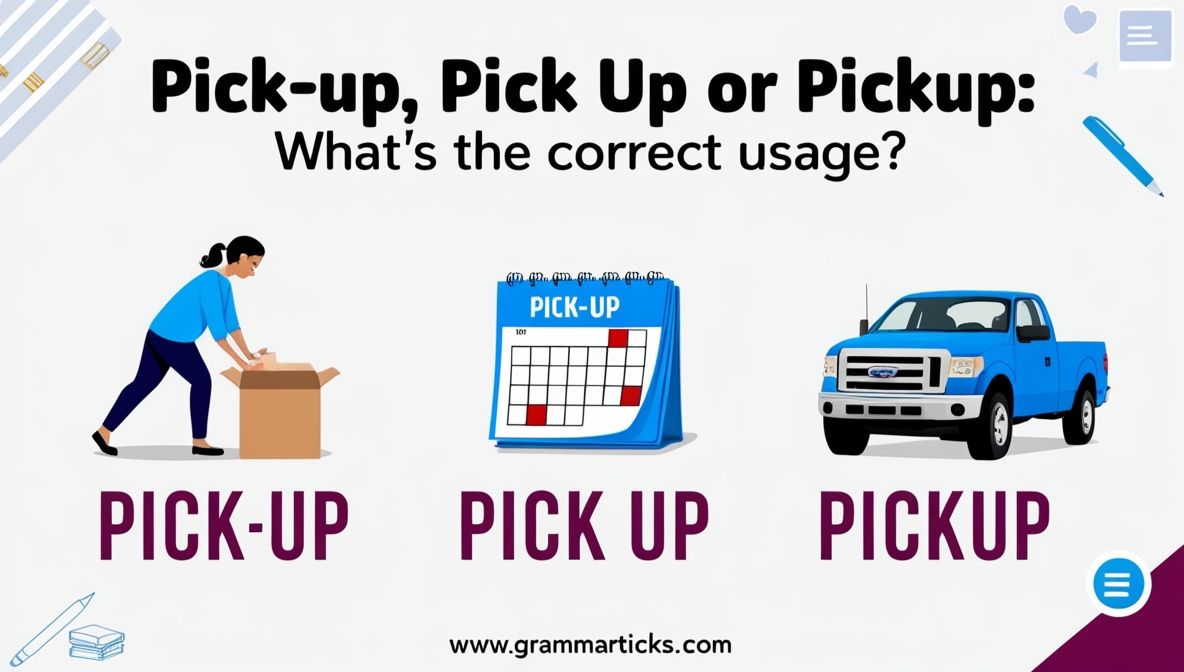When it comes to English word usage, the phrase Pick-Up, Pick Up or Pickup often confuses many writers and speakers. Knowing the difference between these similar-looking terms can make a huge difference in clarity and professionalism. Whether you’re dealing with the pick up phrase as a verb or the noun forms like pick-up or pickup, understanding their roles helps you use them correctly every time.
This article unpacks the verb phrase vs noun distinction, explains the impact of hyphenated words and compound words in English, and offers clear examples. If you’ve ever wondered about the pickup or pick up difference, or when to use a pickup truck versus scheduling a scheduled pickup, you’re in the right place. Let’s break down these English language nuances together.
Why Do Pick-Up, Pick Up and Pickup Cause Confusion?
These three forms often trip people up because they sound identical but function differently in sentences. The confusion mainly arises from their role as either a verb phrase vs noun or an adjective, plus the impact of hyphenation and compound word formation in English.
To make matters trickier, all three can appear in similar situations like talking about collecting something or referring to a vehicle but their spelling changes the meaning entirely. Understanding their pick up meaning in context and the rules behind hyphenated words and compound words in English can clear the fog.
What Is Pick Up? Understanding the Verb Phrase
Pick up is a phrasal verb meaning to lift, collect, or improve something. The words always stay separate, signaling an action happening.
For example:
- I will pick up the kids from school.
- She needs to pick up her package by noon.
- Sales began to pick up after the promotion.
This verb phrase carries different meanings based on context, making it versatile. Remember, when you’re describing an action or process, pick up (two words) is your go-to.
What Is Pick-Up? The Hyphenated Noun or Adjective
When you see pick-up with a hyphen, it usually acts as a noun or an adjective describing something related to collection or retrieval.
Examples:
- We scheduled a pick-up for the trash. (noun)
- He drives a pick-up truck. (adjective)
- The pick-up time is at 4 p.m.
The hyphen ties the words into a compound noun or adjective, signaling a thing or describing something directly connected to the noun it modifies.
What Is Pickup? The Compound Noun
Pickup as one word refers mostly to a specific noun, like a pickup truck or a scheduled collection.
Examples:
- She bought a new pickup last week.
- The courier offers same-day pickup services.
- The pickup arrived early this morning.
In American English, pickup is the standard spelling for vehicles and some service contexts. Unlike pick-up, it rarely serves as an adjective.
When to Use Pick Up or Pickup
Choosing between pick up or pickup depends on the sentence structure and meaning.
| Situation | Use Form | Example |
|---|---|---|
| Describing an action | pick up (verb phrase) | I will pick up the parcel. |
| Naming a vehicle or object | pickup (noun) | He owns a red pickup. |
| Describing something | pick-up (adjective) | The pick-up truck is fast. |
Tip: If you’re describing an action, always separate the words. For a noun or adjective, check if a hyphen or compound word fits the context.
Examples in Real-Life Contexts
Imagine you run a small business offering delivery. You might say:
- Please pick up your order before 5 p.m. (verb phrase – action)
- Our pick-up service is available Monday to Friday. (hyphenated noun)
- The driver arrived in a large pickup. (compound noun – vehicle)
These examples highlight how small changes in spelling affect meaning and help you communicate clearly.
Tips to Overcome Pick-Up, Pick Up or Pickup Confusion
- Identify if it’s an action. If yes, use two words: pick up.
- Is it naming a thing or describing a noun? Use pick-up (hyphen) or pickup (compound).
- Remember the vehicle rule: always pickup truck, no hyphen.
- Read sentences aloud to see if it sounds like an action or a noun.
- Use this simple table as a quick reference.
Synonyms for Pick Up and Pickup
Sometimes swapping words clarifies meaning or improves style. Here are some handy alternatives:
| Term | Synonyms |
|---|---|
| pick up (verb) | collect, gather, fetch, retrieve |
| pick-up (noun) | collection, retrieval, gathering |
| pickup (noun) | truck, vehicle, collection |
Use synonyms thoughtfully to avoid repetition and add variety.
FAQs About Pick-Up, Pick Up and Pickup
Mostly yes, especially when referring to a vehicle or service.
No, “pick up” functions only as a verb phrase.
Use it when it’s a compound adjective or noun, like “pick-up time” or “pick-up service.”
Final Thoughts
In summary, knowing the difference between Pick-Up, Pick Up or Pickup makes your writing clearer. Use pick up when talking about an action or verb phrase. Choose pick-up with a hyphen for nouns or adjectives that describe something related to collection. Use pickup as a noun, especially when referring to a vehicle like a pickup truck or a service. Paying attention to these details helps avoid confusion. With practice, you’ll get comfortable using these words the right way every time. Keep these tips in mind, and your writing will improve fast.

